Cake
I started this blog to write about programming and technology, but my domain name is probably better suited to writing about my other love: food. I've already written about steak, so I thought I should write about something that rhymes: cake.
There sure are a lot of recipes for a regular old sponge cake on the internet. There's a few differences between them, the odd hint of vanilla extract here or a bit of margarine there, but they've all got at least one thing in common: eggs.
The recipes vary in units for the other ingredients; grams, ounces and even - heaven forbid - cups, but eggs are pretty much always specified as a whole number of eggs. Sometimes it's just '3 eggs', sometimes it's '3 large eggs' or '4 medium eggs', but it's mostly a variation on that theme.
Bad Eggs
A quick survey of the eggs in my kitchen reveals quite a discrepancy in weight. Here's a (sorted) list:
----------------
| Egg | Weight |
|-----|--------|
| 0 | 51g |
| 1 | 53g |
| 2 | 53g |
| 3 | 54g |
| 4 | 57g |
| 5 | 58g |
| 6 | 60g |
| 7 | 61g |
| 8 | 62g |
| 9 | 63g |
| 10 | 65g |
| 11 | 65g |
----------------
These were all from a box of 'medium' eggs.
One of the first sponge cake recipes I found calls for '2 medium eggs'. Depending on which eggs I happened to pick for that recipe, I could be using as little as 104 grams of egg, or as much as 130 grams; a whopping 25% more.
For a discipline such as baking, that so often requires precision, specifying '125 grams of flour', and then '2 eggs' just seems silly. Some recipes correct for the potential inaccuracy by specifying a weight of egg, and some recipes go one step further by specifying the weight of egg white and egg yolk separately!
This can seem like a bit of a faff; you've got to mess around separating the eggs, when what you really want to be doing is eating cake as soon as possible. It can seem like a bit of a waste too: what if you only need to use 20% of an egg? If you've got no more baking planned for the day, what use is 80% of an egg?
My (actually my mother's) solution is easy: weigh the eggs, use the same weight for your flour, butter and sugar. This eliminates the egg-weight inconsistency, doesn't waste any eggs, you can change the size of the cake by adding or removing eggs, and it's easy; you don't even need any scales.
Eureka
If you've got force-measuring scales you can just make a note of how much the eggs weigh. If you've got balance scales you can put the eggs on the side usually used for the weights and the ingredients in the other. Or you could make like Archimedes.
Find a large transparent container, like a clear plastic bowl or a glass tankard, and fill it roughly one quarter of the way with water. Then find a second, smaller container (like a plastic beaker or another bowl) and put the eggs in it. I used a measuring jug and a drinks bottle with the top cut off.

Float the container of eggs in the water and watch the water level rise! Mark the water level on the outer container with a marker or bit of tape.
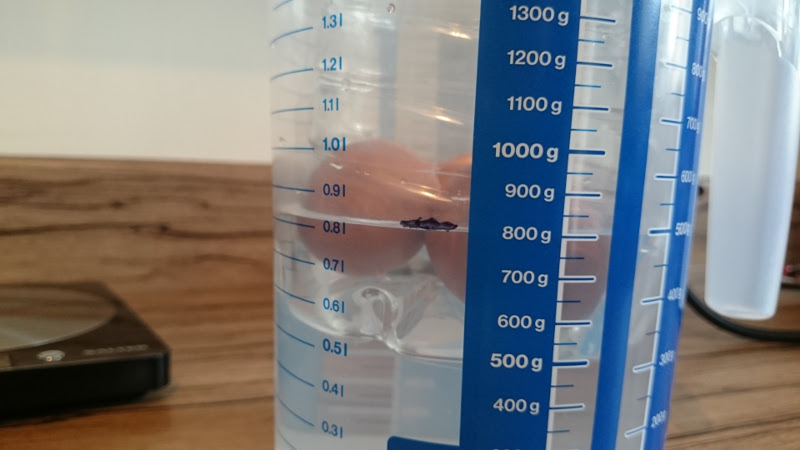
Take the eggs out of the inner container and fill it with your next ingredient until the water level is back up to the mark.
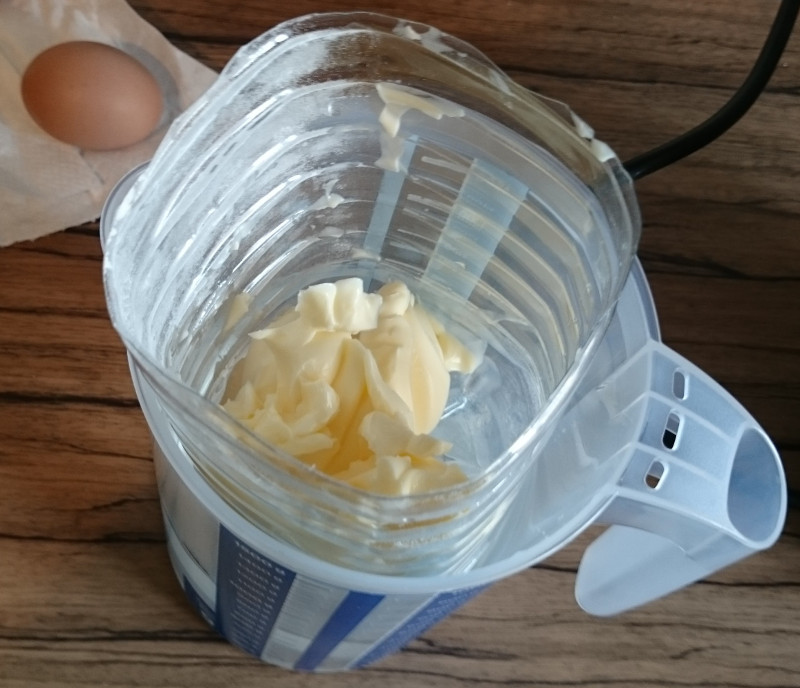
Repeat for the rest of your ingredients and you should have roughly the same weight of everything. It's a good idea to weigh your dry ingredients first so that subsequent ingredients don't stick to the container.
I used the Archimedean method to 'weigh' three eggs, and then tried my best to get the same weight of flour, butter and sugar. To see how accurate I'd been, I then weighed each ingredient with my digital scales.
------------------------------
| Ingredient | Actual Weight |
|------------|---------------|
| Eggs | 175g |
| Sugar | 180g |
| Flour | 171g |
| Butter | 178g |
------------------------------
Not bad! Not bad at all! Out by 5 grams at the most; much less than the 25% I could have been out by blindly following a '3 egg' recipe.
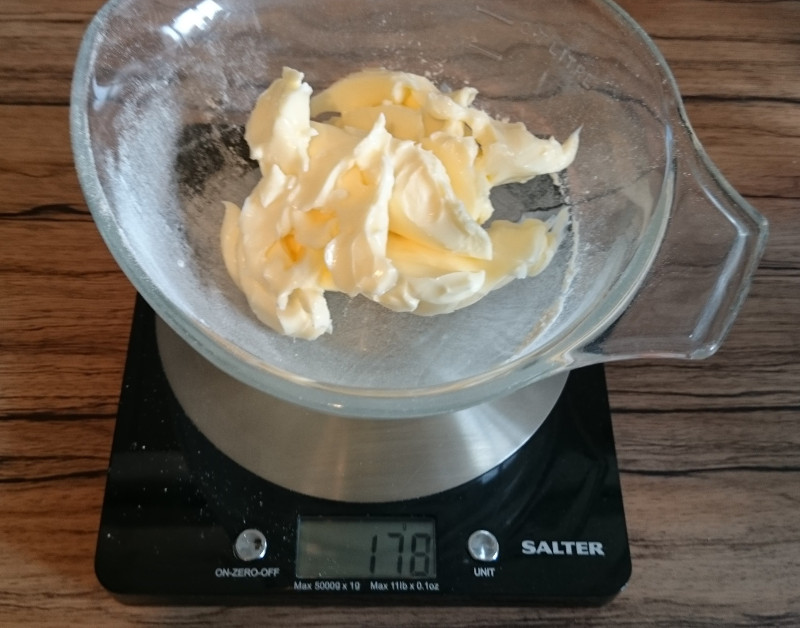
The Proof Is In The Pudding
Cream the butter and sugar together, beat in the eggs, mix in the flour and stick it all in a couple of cake tins. I've found 15 to 20 minutes at 180°C (in an electric fan oven) works well for me. The classic test for checking if a cake is done or not is to stick a skewer in the middle of it; if it comes out covered in raw cake mixture: it ain't done yet.
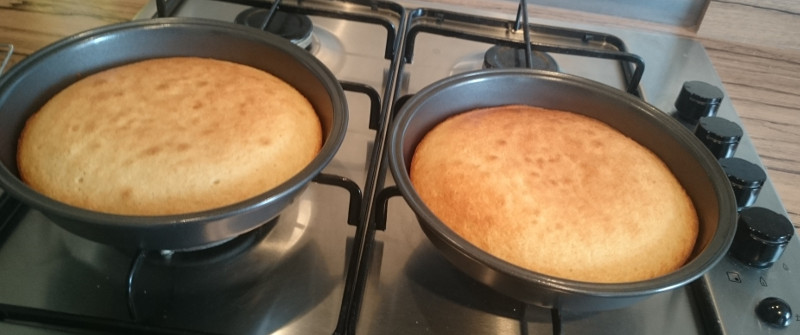
My favourite filling for a sponge cake is buttercream and seedless raspberry jam. Equal weights work well for buttercream too; but it's much less critical. To save time (my partner was growing impatient by this point) I weighed out 100 grams of butter and 100 grams of icing sugar with my digital scales, and then mixed them up good and proper.
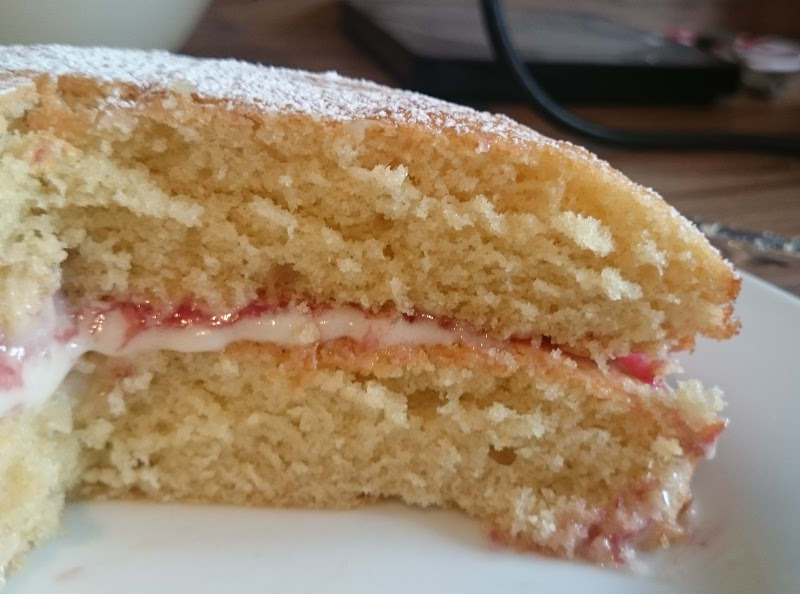
Just don't do what I did and put the buttercream on the cake before it's fully cooled. I did say I wanted to eat cake as soon as possible. Whoops.
Why?
I used this method to make cake at university, when I actually didn't have any weighing scales. I tried making a balance scale, but that turned out to be quite difficult to do. Given the choice, I would weigh the eggs without shells on a digital scale, but that's not always an option.
The cake was lovely by the way; despite the melted buttercream. It got t'other 'alf's seal of approval anyway.
First posted: Sun, 16 Aug 2015 17:40:25 +0000